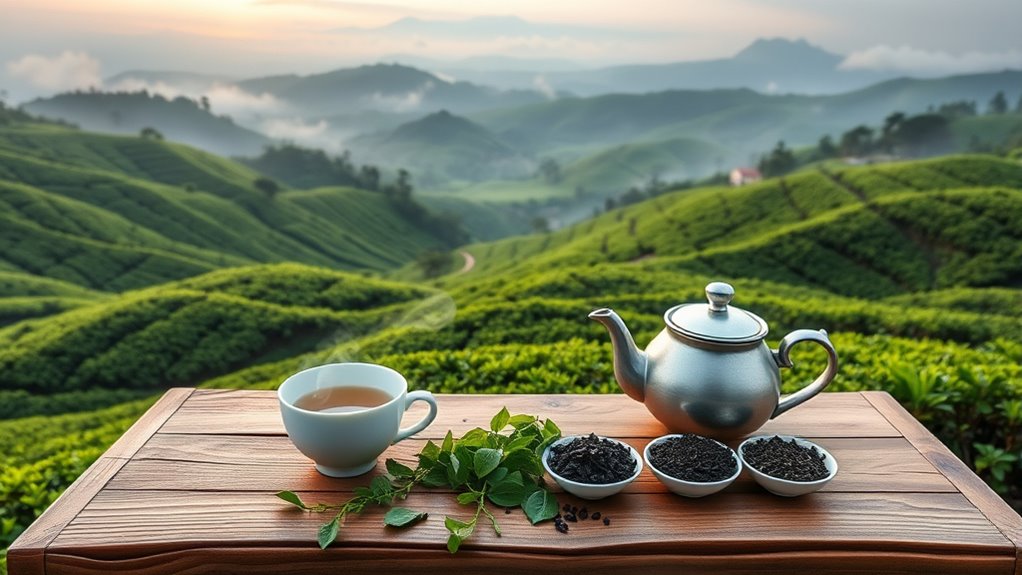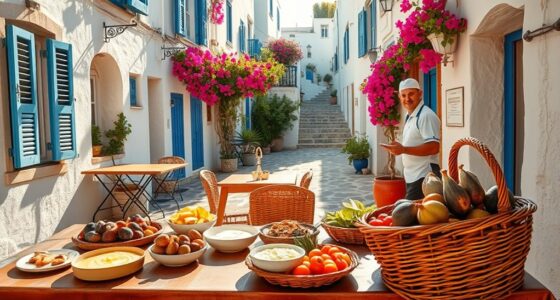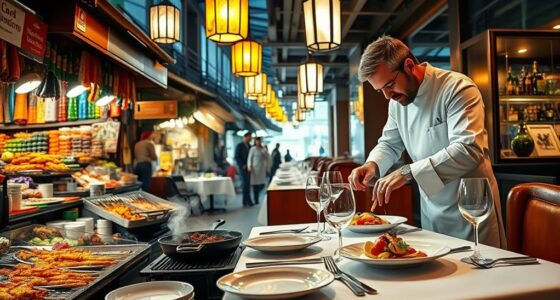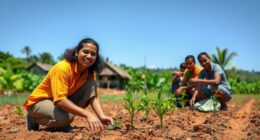Exploring tea plantations worldwide offers an immersive taste of diverse flavors and rich traditions. From the delicate floral notes of Darjeeling to the bold, brisk teas of Kenya, each region’s processing methods and climate shape unique profiles. Visiting estates provides insights into traditional plucking and processing techniques, enhancing your appreciation. If you continue exploring, you’ll discover how these cultural and environmental factors influence your favorite cup of tea and its story.
Key Takeaways
- Visiting renowned tea estates like Darjeeling, Nuwara Eliya, Kenyan Rift Valley, and Malaysian Cameron Highlands offers immersive tasting and learning experiences.
- Tasting at the source allows appreciation of regional flavor profiles shaped by unique terroirs and processing methods.
- Plantation tours often include demonstrations of traditional plucking, processing, and blending techniques.
- Regional teas such as floral Darjeeling, robust Kenyan black teas, and scented Vietnamese varieties showcase diverse cultural influences.
- Exploring global tea production trends highlights the evolving landscape and increasing popularity of specialty and green teas worldwide.
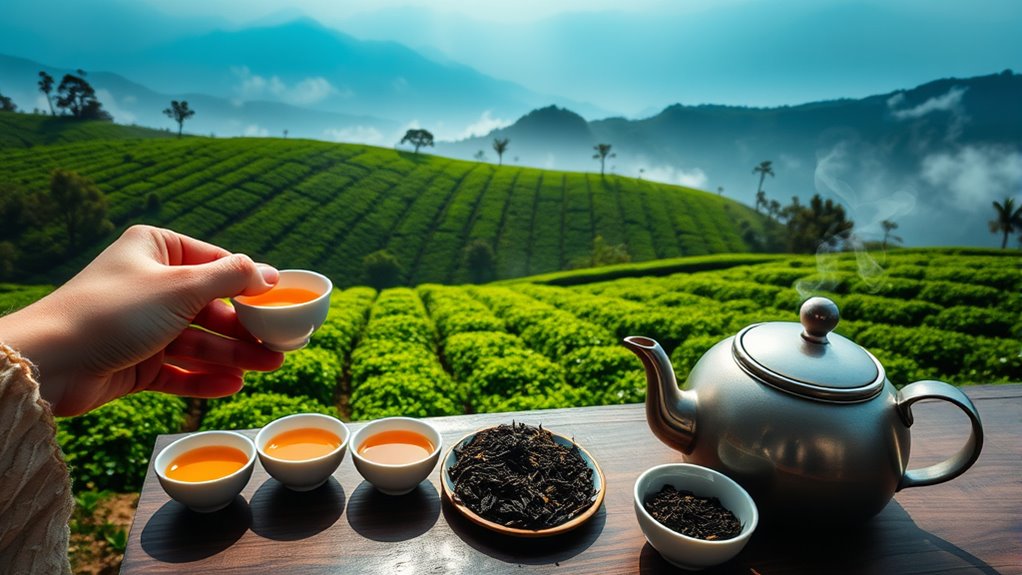
Tea plantations around the world offer a diverse array of tasting experiences that reflect their unique climates, cultures, and processing methods. When you visit a plantation, you get a chance to taste the distinct flavors that each region’s environment imparts to its teas. For example, in Darjeeling, India, you’ll experience light, aromatic teas that are prized for their delicate floral notes. Touring the plantations, you can observe traditional plucking and processing methods, gaining insight into how the unique terroir influences the final product. Similarly, Sri Lanka’s high-altitude plantations in Nuwara Eliya produce a range of teas, from light and floral to rich and malty. Walking through these lush landscapes, you can taste different teas right at their source, understanding how altitude and climate shape their flavor profiles. Tea production has steadily increased globally, allowing for a broader variety of teas to be available to consumers worldwide.
In Kenya’s Rift Valley, the focus is often on strong, black teas. Here, you’ll enjoy robust, astringent brews and see demonstrations of the CTC (Crush, Tear, Curl) processing method, which is widely used in the region. The high-altitude plantations produce teas with a bold character, perfect for those who prefer a brisk cup. The processing methods, such as CTC, are designed to produce uniform, strong teas suitable for mass production and export. Vietnam’s tea plantations, on the other hand, offer a different experience. You can taste scented teas like Lotus and Jasmine, which are deeply embedded in local culture. These teas often incorporate unique floral and fragrant notes that reflect Vietnam’s rich tradition of blending and flavoring, making each sip a cultural journey.
Malaysia’s Cameron Highlands is known for its scenic Boh Tea Plantation, where you can enjoy panoramic views of rolling tea fields while sampling their signature brews. You can also learn how the climate and terrain influence the taste of the teas grown there. The climate and terrain foster the growth of teas with distinct character, and the plantation tours often include tastings that highlight Malaysian flavor profiles. Meanwhile, in Malawi, estates like Satemwa produce a variety of specialty teas from expansive plantations. Visiting these farms, you’ll taste teas with a unique estate-specific character, appreciating the diversity within African tea production. Zimbabwe also offers a glimpse into Africa’s growing tea industry, with plantations producing teas that are gaining recognition for their quality.
As global production trends shift, countries like Kenya, Malawi, and China continue to expand their plantations, reflecting growing demand for green and specialty teas. When you explore these regions, you find that each offers a different story—whether it’s the tradition behind Indian teas, the boldness of Kenyan black teas, or the fragrant scented varieties of Vietnam. Visiting these plantations, tasting the teas on-site, and learning about their processing will deepen your appreciation for the complex journey each cup takes from plant to palate. Understanding tea processing methods is essential to fully appreciating the unique qualities of each tea, from fresh leaves to finished brew.
Frequently Asked Questions
How Do Plantation Tours Accommodate Guests With Mobility Challenges?
You’ll find that plantation tours accommodate guests with mobility challenges by offering features like ramps, lifts, and accessible paths. They welcome wheelchairs, walkers, and strollers, often providing courtesy wheelchairs. Staff support is available to assist, and you’re encouraged to communicate your needs beforehand for tailored arrangements. Some tours are flexible with terrain, ensuring scenic spots are accessible. However, check in advance, as accessibility levels vary between locations.
Are There Options for Personalized Tea Blending Experiences?
You ask about personalized tea blending options, and the answer is yes. You can work with tea experts to create unique blends tailored to your tastes, occasions, or wellness goals. Whether in person or virtually, you’ll explore herbs, floral, and traditional teas, experiment with flavors, and take home your custom creation. These experiences make memorable gifts, enhance knowledge, and let you indulge in creativity while enjoying premium ingredients.
What Sustainable Practices Are Implemented on These Tea Plantations?
You’ll find that many plantations adopt sustainable practices like using organic fertilizers and compost to keep soils healthy. They minimize chemical pesticides by promoting natural pest control and encourage biodiversity through interplanting native plants. Water conservation methods, such as rainwater harvesting and drip irrigation, are common. Plus, integrating shade trees, restoring soils, and supporting local communities help reduce environmental impact and guarantee the longevity of tea cultivation.
Can Visitors Participate in Tea Leaf Plucking Activities?
Yes, you can participate in tea leaf plucking activities. Many plantations offer guided tours where you learn traditional methods, often dressed in local attire and using baskets. You’ll engage with local workers, gaining hands-on experience in selecting the best leaves. This immersive activity helps you understand the effort behind tea production, connects you with local culture, and provides a memorable, authentic experience in scenic plantation environments.
Are There Exclusive Tasting Events for Rare or Vintage Teas?
Yes, you can participate in exclusive tasting events for rare and vintage teas. These specialized sessions showcase stunning, storied sips from historic harvests, often guided by skilled sommeliers or tea masters. You’ll savor sophisticated, century-old teas, compare contrasting varieties, and learn about their unique origins. Limited spots make these luxurious, layered experiences all the more memorable—perfect for passionate tea lovers enthusiastic to explore extraordinary flavors and deepen their tea knowledge.
Conclusion
As you sip the warm, fragrant tea amidst lush green fields, you feel connected to centuries of tradition and the vibrant landscapes that nurture each leaf. From misty mountains to sun-drenched valleys, every plantation offers a unique story and sensory journey. So, next time you take a sip, imagine yourself wandering through these verdant worlds, tasting the essence of distant lands. Let each cup inspire your curiosity and deepen your appreciation for the art of tea.
